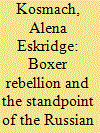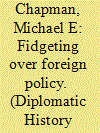| Srl | Item |
| 1 |
ID:
124337


|
|
|
|
|
| Publication |
2013.
|
| Summary/Abstract |
The article is devoted to the examination of the reaction of the Russian press towards the Boxer Rebellion in China. The events connected with the Boxer Rebellion in China had a very strong influence on Russian society and its press. The development of Boxer Rebellion and the suppression of it made Russia define its position on the question of China and at the same time became one of the most important topics for the Russian press in 1900. The discussion of the problem revealed the different points of view and the different approaches towards the solution of this problem in Russian Far Eastern policy.
|
|
|
|
|
|
|
|
|
|
|
|
|
|
|
|
| 2 |
ID:
131449


|
|
|
|
|
| Publication |
2013.
|
| Summary/Abstract |
When David Kennedy's magisterial Freedom from Fear criticizes Franklin Roosevelt's East Asian policy making it is to suggest that "a little appeasement-another name for diplomacy-might have yielded rich rewards." Some 430 pages earlier, Kennedy passed over the Stimson Doctrine, except to attribute its "timid" stance to isolationist public opinion, stressing instead how, "On the wind-scoured plains of Manchuria, Japan thus set the match in 1931 to the long fuse that would detonate the attack on Pearl Harbor." By setting aside what I call Tenaka teleology to concentrate on the psychological and ideological reasons for Henry Stimson's persistent interventionism following the Mukden (Shenyang) Incident, this article seeks to build on Kennedy's intimation that diplomatic appeasement could have slowed, detoured, or even stopped the Japanese juggernaut. After emphasizing Stimson's initial inaction, and then showing how U.S. diplomats and State Department officials-Stimson included-approved of Japan's involvement in Manchuria and sympathized with its difficulties there, this article argues that far from leaving well alone as realpolitik sensibilities demanded, Stimson acted instead to satisfy a string of personal affronts to his honor. God-fearing American elites, in his understanding, shouldered the responsibility of extending civilization westward, into Asia. As Secretary of State for the nation so charged by providence, Stimson internalized his role as the arbiter of moral behavior. Upstart Orientals running amok in the Pacific, particularly when they claimed to emulate Americans, roiled the order he felt it was his duty to police, offending his sense of self and jeopardizing his legacy.
|
|
|
|
|
|
|
|
|
|
|
|
|
|
|
|
| 3 |
ID:
180789


|
|
|
|
|
| Summary/Abstract |
In recent years, Iranian senior officials have laid stress on the Eastern
course in foreign policy. This orientation has been discussed by various
analysts and raised diverse perspectives. The present paper sets to explore
Iran’s Eastern policy in terms of its opportunities and limitations. It
raises the important question of what the main features of Iran’s Eastern
strategy are and what potential and constraints it has.
|
|
|
|
|
|
|
|
|
|
|
|
|
|
|
|